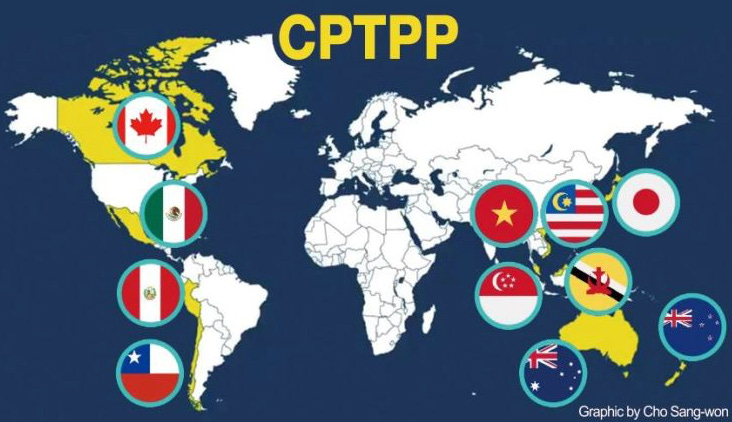Welcome back to our fortnightly column on China in the news. The What China Wants podcast will return next week.
Please do give us some feedback, including on any news stories you want us to write about. Many thanks for reading.
UK Joins the CPTPP
After years of discussions, it appears that the UK is about to be greenlit to join the Indo-Pacific trade bloc, the Comprehensive and Progressive Agreement for Trans-Pacific Partnership (CPTPP).

The CPTPP is one of the largest trade blocs in the world, slightly smaller than the EU in terms of percentage of global GDP, and was born out of the old Trans-Pacific Partnership that President Trump destroyed when he pulled America out of it in 2017. There are eleven members scattered along the shores of the Pacific - Australia, Brunei, Canada, Chile, Japan, Malaysia, Mexico, New Zealand, Peru, Singapore, and Vietnam.
What these countries have in common is that they are middle powers with open economies, many of which are growing quickly. Analysts predict that the UK’s membership will give an economic boost to the bloc for both sides, with Britain’s service industry in particular set to benefit (even if there is some debate as to whether it will make up for opportunities curtailed by Brexit).
From a geopolitical perspective, it is a win for both the UK and the existing members. London capitalises on its ambition to tilt towards the Indo-Pacific, and the CPTPP receives a link Europe as well as a senior middle power to help push back against China. This latter point is not well publicised, but it is certainly in the minds of Japan and Australia. The fact that China has actually applied to join the CPTPP is of concern to some, and it seems that there is a thought that having the UK on board may make this less likely.
This does, however, mean that London is at risk of being drawn into more geopolitical stress with Beijing. But the advantages of being part of such a vibrant trade bloc must be seen as worth the risk.
Labour’s (Missing) China Manifesto
Given the collapse in China-US relations, and the increasing exposure the UK has to China (as Evenstar Institute research continues to reveal), it would be hoped that the British political establishment would be taking China as seriously as possible by now. Apparently not, judging by a report released this week.
The UK’s Shadow Foreign Secretary David Lammy has set out the Labour Party’s foreign policy manifesto in a 14,000 word pamphlet published by the Fabian Society.
The challenge of China was not ignored, and indeed garnered 33 mentions (compared to 26 for Russia and 40 for Europe). There was not, however, much in the way of policy towards Beijing, more a description of China’s recent actions such as its sanctions against British allies Australia and Lithuania, and its “repression at home and more assertive behaviour abroad”. The only real concrete policy viz China was a follow announcement by Lammy that a Labour government would pursue legal routes toward declaring China’s crackdown on Uyghur Muslims a “genocide”.
Being light on an integrated China policy is of concern when Labour is odds-on to win the next General Election (slated for 2024). It might be argued that this is only an early foray by Labour into foreign policy and so not much should be expected, but the riposte is two-fold. First, time is not on Labour’s side, given that there are signs that China might make a move on Taiwan sometime before 2027 – and planning for the chronic economic shock that this would lead to will take a long time to do. Second, China is not just “foreign policy”. Such is Beijing’s influence, in everything from digital infrastructure to academia and tourism, that the challenge of China has to be looked at cross-ministry.
The Fabian pamphlet was a chance for Labour to set out how they would do this, and face head-on one of the most important issues of our time in a nuanced, positive fashion. But it was a chance blown.



